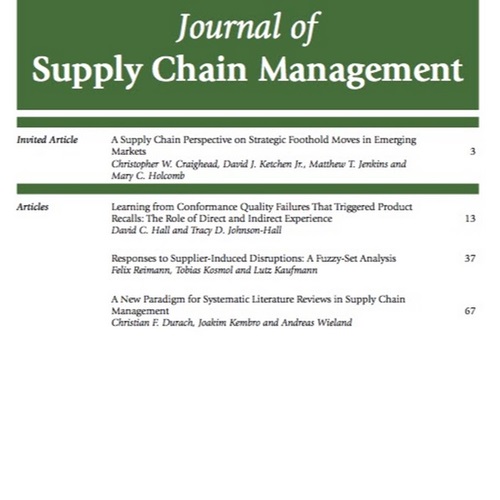Transforming food supply chains for sustainability
IF 9.9
2区 管理学
Q1 MANAGEMENT
引用次数: 0
Abstract
Abstract Modern food supply chains—infused with scientific and engineering innovations—have made food increasingly more affordable and accessible. Yet there is growing concern about the long‐term sustainability of our food system. Over time, the inputs (e.g., water, fertile soil, fossil fuels, and chemicals) and working resources (e.g., land and labor) required for industrial food production and its associated supply chain structure have become more scarce and hence more expensive. At the same time, the by‐products of these farming and supply chain activities (e.g., farm runoff and greenhouse gas emissions) have often created negative externalities on the environment and human health. To improve the sustainability of food production, research from the life sciences recommends adoption of transformative farming methods that incorporate ecological principles in a sustainable approach to farming. Operationally, this approach leverages economies of scope . In order to maintain strategic alignment, changing food production methods should be complemented with appropriate changes in the rest of the supply chain, including consumption habits. We propose a research agenda informed by findings from the life sciences, which integrates approaches from supply chain management as well as food and agricultural economics, to align all food supply chain partners with sustainable food production.转变食品供应链,促进可持续发展
现代食品供应链注入了科学和工程创新,使食品越来越便宜和容易获得。然而,人们越来越关注我们粮食系统的长期可持续性。随着时间的推移,工业化粮食生产及其相关供应链结构所需的投入(如水、肥沃土壤、化石燃料和化学品)和工作资源(如土地和劳动力)变得越来越稀缺,因此也越来越昂贵。与此同时,这些农业和供应链活动的副产品(例如,农场径流和温室气体排放)往往对环境和人类健康造成负面的外部影响。为了提高粮食生产的可持续性,来自生命科学的研究建议采用变革性的农业方法,将生态原则纳入可持续的农业方法。在操作上,这种方法利用了范围经济。为了保持战略一致性,在改变食品生产方法的同时,应适当改变供应链的其余部分,包括消费习惯。我们提出了一个以生命科学研究成果为基础的研究议程,该议程整合了供应链管理以及食品和农业经济学的方法,使所有食品供应链合作伙伴与可持续食品生产保持一致。
本文章由计算机程序翻译,如有差异,请以英文原文为准。
求助全文
约1分钟内获得全文
求助全文
来源期刊

Journal of Supply Chain Management
MANAGEMENT-
CiteScore
16.00
自引率
6.60%
发文量
18
期刊介绍:
ournal of Supply Chain Management
Mission:
The mission of the Journal of Supply Chain Management (JSCM) is to be the premier choice among supply chain management scholars from various disciplines. It aims to attract high-quality, impactful behavioral research that focuses on theory building and employs rigorous empirical methodologies.
Article Requirements:
An article published in JSCM must make a significant contribution to supply chain management theory. This contribution can be achieved through either an inductive, theory-building process or a deductive, theory-testing approach. This contribution may manifest in various ways, such as falsification of conventional understanding, theory-building through conceptual development, inductive or qualitative research, initial empirical testing of a theory, theoretically-based meta-analysis, or constructive replication that clarifies the boundaries or range of a theory.
Theoretical Contribution:
Manuscripts should explicitly convey the theoretical contribution relative to the existing supply chain management literature, and when appropriate, to the literature outside of supply chain management (e.g., management theory, psychology, economics).
Empirical Contribution:
Manuscripts published in JSCM must also provide strong empirical contributions. While conceptual manuscripts are welcomed, they must significantly advance theory in the field of supply chain management and be firmly grounded in existing theory and relevant literature. For empirical manuscripts, authors must adequately assess validity, which is essential for empirical research, whether quantitative or qualitative.
 求助内容:
求助内容: 应助结果提醒方式:
应助结果提醒方式:


